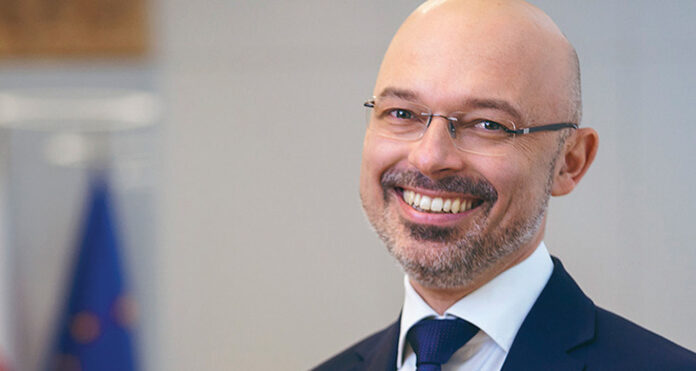As a state, we do not want to stand aside, but we are actively working to be one of the leaders of this revolution. This is why I am very happy that the Global e-Mobility Forum will take place on 21 November in Poland.

and the first Polish Minister of Climate
Last year Poland hosted the United Nations Climate Change Conference (COP24).
What did Poland want to achieve during the conference?
In each of the leading topics of the Polish Presidency (technology, human, nature) we presented very specific and measurable declarations that make a significant contribution to global climate protection policy. The first one is a declaration on just transition entitled Solidarity and Just Transition Silesia Declaration focusing on ensuring solidarity and just transition which will enable climate protection while maintaining the economic development and workplaces. The second proposition is The Ministerial Katowice Declaration on Forests for the Climate, which concentrates on climate neutrality inspired by the so-called forest coal farms project. The third one is the Driving Change Together Partnership aiming at actions for the development of e-mobility and zero-emission transport. The last declaration is our priority considering the Global e-Mobility Forum organized in Poland in November.
There is increasing talk that e-mobility will change the way we move in a few years. What is the position of Poland in the field e-mobility?
The fact that e-mobility is one of our priorities is evidenced primarily by the “Energy for the future” E-mobility Development Plan adopted by the Ministry of Energy. It is worth highlighting that this was developed in 2016. Even then we considered e-mobility as the technology of the future. When the document was being drawn up, the EV market was just developing. There were about 1 million electric vehicles on the world’s roads. Nowadays, there are as many as 6-7 million electric vehicles on the roads. In 2040, it is foreseen that 41 million electric vehicles will be sold. As part of the Strategy for Responsible Development, the Polish government has already developed a number of regulations aimed at promoting low- and zero-emission vehicles, such as the Clean Transport Package and its E-mobility Development Plan in Poland as well as the National Framework for Alternative Fuels Infrastructure Development Policy.
Are the effects visible yet?
Definitely yes. LG Chem, the largest factory in Europe manufacturing batteries for EVs, operates in Poland. In the first quarter of 2019, our country was the largest exporter of lithium-ion batteries in the EU. This is followed by a rapidly growing supply chain. E-mobility is one of the largest areas currently served by the Polish Investment and Trade Agency. We are a pioneer of electric buses and their largest exporter in the EU. The largest charger in Europe is produced in Poland. It has 1.2 megawatts and it was created by Ekoenergetyka from Zielona Góra. Poland, after China, Taiwan and Korea, is the 4th largest manufacturer of electric batteries in the world. We are also the EU leader in electric car sharing.
As a state, we do not want to stand aside, but we are actively working to be one of the leaders of this revolution. This is why I am very happy that the Global e-Mobility Forum will take place on 21 November in Poland. It will be the first event in Poland dedicated to e-mobility with such high prestige and supranational rank.
Apart from the greater presence of electric cars, how will people feel the development of e-mobility?
Nowadays we place enormous requirements on transport. We pay attention to the quality of air and noise level. E-mobility is the answer to social needs. On the one hand, it is cleaner transport. On the other, it is a brand new idea of moving. What I mean here in particular is moving away from owning a car in favour of car sharing, which significantly limits, for example, the problem of parking. The use of means of transport such as electric scooters or scooters should also be emphasised. Many innovative solutions for cities of the future, such as public transport on demand with a flexible route, are based on electric drive. It is a revolution that silently sneaks up on us from many sides, but when we look back it will be omnipresent.
Does e-mobility pay off? When will the average Polish Joe be able to buy the electric vehicle?
When answering this question, it is worth adopting two perspectives. The first one is the perspective of the average Polish Joe – a person who faces the decision of buying a car. He devotes considerable money to the purchase and wants to be sure that the costs of buying and operating a new vehicle will outweigh any disadvantages. Currently, TCO – the total cost of ownership of combustion and electric cars are quite similar. This is a result of the rapid development of the EV market. Forecasts assume that the cost of a battery, which was 3/5 of the vehicle price in 2015, will only be 1/5 of this price in 2025. In turn, the cost of batteries has dropped by as much as 80 percent over the past 10 years, together with electricity that can be obtained from renewable sources and which is cheaper than gasoline and diesel fuel. Taxes are also lower and service costs are only about 1/3 of the cost of servicing combustion cars.
There is also another perspective. We have to take into account the environmental profitability and thereby, quite simply, better health. We cannot only look at our personal profit but also at the social costs. When deciding to buy a zero- or low-emission vehicle, we save together as a society. We have to invest in order to save. If we want to develop e-mobility at the same pace as this is happening in Western Europe, the USA or China, we must take measures in the form of financial support for the purchase of electric vehicles and infrastructure development. We will discuss how to do this, among other issues, during the Global e-Mobility Forum.
We are talking just a few days after the new government nominations were announced and you have been appointed minister for Climate in this totally new ministry. What lies behind the need to have such a ministry?
We must Focus today on common efforts towards climate protection. That is why Poland is assuming this proactive approach and meeting the expectations of our European partners. We must find common ground with them on many levels. That is not all, though. We are also responding to the ambitions of our society – we all want to breathe clean air and have no anxiety about water supplies. We want to manifest solidarity with the world by making the best use of our natural resources. For all these reasons, we decided
a totally new task-focused structure at ministerial level needs to be established.








